|
|
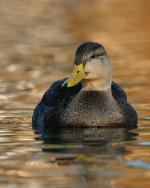
|
American Black Duck
|
|
Description: Black ducks are similar to mallards in size, and resemble the female mallard in coloration, though the black duck's plumage is darker. The male and female black duck are similar in appearance, but the male's bill is yellow while the female's is a dull green. The head is slightly lighter brown than the dark brown body, and the speculum is iridescent violet-blue with predominantly black margins. In flight, the white underwings can be seen in contrast to the dark brown body. |
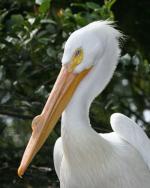
|
American White Pelican
|
Overview
American White Pelican: Huge, white seabird, enormous outstretched wings show black primaries, outer secondaries in flight. Bill, legs are bright orange, upper bill develops a fibrous keel during breeding season. Slow, deep wing beats. Soars high on thermals. Flies in straight line or V formation. |
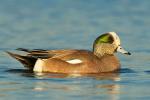
|
American Wigeon
|
Overview
American Wigeon: Medium dabbling duck, brown body with white crown, large green ear patch extending to back of head, buff washed breast and sides, and white belly. White shoulder patches visible in flight. Black-tipped pale blue bill. Swift direct flight, strong wing beats. Flies in tight flocks. |
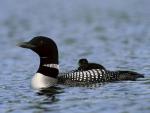
|
Arctic Loon
|
Overview
Arctic Loon: Medium loon with straight, stout bill, white-spotted black back, white flanks visible above water while swimming. Head and nape are gray. Neck has bold black and white stripes on sides and green or purple throat bar that may be difficult to see. Feeds on fish, mollusks, and crustaceans. |
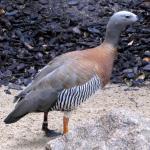
|
Ashy-headed Goose
|
Description
The Ashy-headed Goose averages 50-55cm in length (from head to tail). The plumage is pale brown on the back. It has a chestnut neck and black-barred white flanks. The head is grey. |
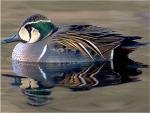
|
Baikal Teal
|
Overview
Baikal Teal: Small dabbling duck, head pattern of pale brown, green, white, and black. Pink breast has dark spots, flanks are gray bordered with vertical white stripes, scapulars are brown, black, and white. Wing speculum is green with buff upper and white lower border. Black undertail coverts. |
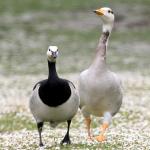
|
Bar-headed Goose
|
|
The bird is pale grey and is easily distinguished from any of the other grey geese of the genus Anser by the black bars on its head. It is also much paler than the other geese in this genus. In flight, its call is a typical goose honking. A mid-sized goose, it measures 71–76 centimetres (28–30 in) in total length and weighs 1.87–3.2 kg (4.1–7.1 lb). |
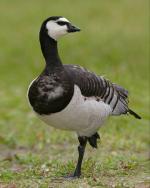
|
Barnacle Goose
|
Overview
Barnacle Goose: Medium goose, distinctive white face, jet-black head, neck, and upper breast. Wings and back are silver-gray with black-and-white bars. Belly is white. V-shaped white rump patch and silver-gray underwing linings are visible in flight. Black bill,legs and feet. Strong direct flight. |
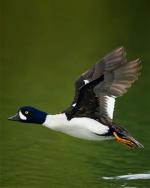
|
Barrow's Goldeneye
|
Overview
Barrow's Goldeneye: Medium diving duck with black upperparts, contrasting white shoulder bars, white underparts. Head is large, glossy, and purple-black with golden yellow eyes and a crescent-shaped white patch behind a dark bill. White wing patches are visible in flight. Yellow legs and feet. |
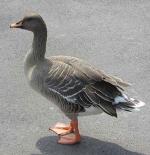
|
Bean Goose
|
Overview
Bean Goose: Large goose, scaled brown upperparts, white underparts. Head, neck are dark brown. Black bill with yellow-orange saddle. Tail is dark with white undertail coverts. Legs and feet are orange. Feeds on plants, seeds, fruits. Strong direct flight on steady wing beats. Flies in V formation. |
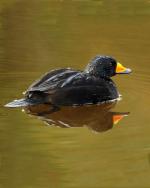
|
Black Scoter
|
Overview
Black Scoter: Medium diving duck, entirely black except for yellow knob at base of black bill. Legs and feet are black. The male is the only all black duck in North America. Dives for food, primarily eats mollusks. Strong direct flight with rapid wing beats. Flies in straight line and V formation. |
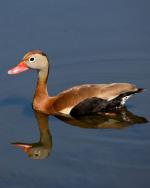
|
Black-bellied Whistling-Duck
|
Overview
Black-bellied Whistling-Duck: Large, colorful duck with bright red bill, pink-red legs and feet. Shows white wing patch, black belly, reddish-brown breast, neck and back. Face, foreneck are gray, white eye ring. Feeds on aquatic plants, cultivated grains, seeds. Direct flight on rapid wing beats. |
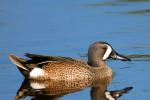
|
Blue-winged Teal
|
Overview
Blue-winged Teal: Small dabbling duck, purple-gray head, distinct white crescent on face. Upperparts are scaled buff, dark brown; underparts are pale brown with numerous dark spots. Wings have green speculum, pale blue shoulder patch visible in flight. Fast direct flight with steady wing beats. |
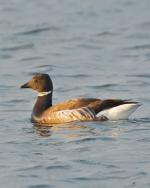
|
Brant
|
Overview
Brant: Small goose, dark brown upperparts and brown-barred, pale gray underparts. Head is black; short black neck has partial white ring. Tail and vent are white. Western race, formerly known as the Black Brant, is darker. Heavy direct flight with strong wing beats. Flies in straight line formation. |
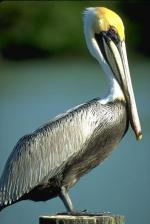
|
Brown Pelican
|
Overview
Brown Pelican: Large, unmistakable seabird, gray-brown body, dark brown, pale yellow head and neck, oversized bill. Black legs, webbed feet. Feeds on fish by plunge diving and scooping them up with pouch. Powerful flight alternates flaps with short glides. Flies close to the water in straight line. |
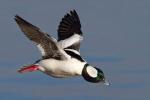
|
Bufflehead
|
Overview
Bufflehead: Small diving duck, mostly white with glossy green-black to purple-black head and back. Head has large white patch behind eye. The wings are dark with white patches visible in flight. Feeds on aquatic plant seeds and insects, larvae, and snails. Swift direct flight with rapid wing beats. |
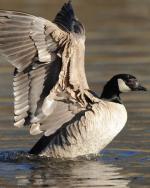
|
Cackling Goose
|
Overview
Cackling Goose: Formerly included in the Canada Goose family, this species is smaller with a rounder head and shorter neck and bill. There are four subspecies, we show the hutchinsii that has darker upperparts and a white neck ring. Winters from the southern Great Plains to the western Gulf Coast. |
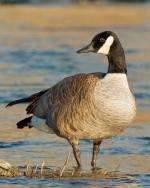
|
Canada Goose
|
Overview
Canada Goose: Large, long-necked goose with dark upperparts and paler underparts grading to white on vent. The head and neck are black with white chin bar. Body is usually gray-brown, although varies from dark brown to gray in different races. White semi-circle above black tail is visible in flight. |
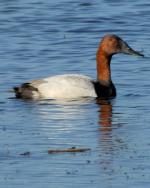
|
Canvasback
|
Overview
Canvasback: Large, flashy diving duck with pale gray body and black breast, tail. Head is red-brown with long, sloping profile and long, dark bill. Eye is red. Legs and feet are gray. Feeds primarily on aquatic plants. Rapid direct flight with strong wing beats. Flies high, usually in V formations. |
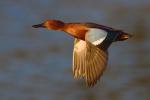
|
Cinnamon Teal
|
Overview
Cinnamon Teal: Small dabbling duck, scaled, dark brown upperparts, cinnaon-brown underparts, head, neck. Eyes are red and bill is relatively long and dark. Green speculum, pale blue shoulder patch on wing are separated by white line. Yellow-gray legs. Swift direct flight with rapid wing beats. |
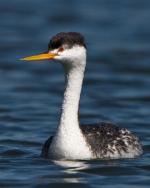
|
Clark's Grebe
|
Overview
Clark's Grebe: Large grebe, gray-black upperparts, white underparts, and slender neck with white on front and black on back. White face, black cap extends nearly to red eyes. Bill is yellow-orange. Until the 1980's thought to be a pale morph of the Western Grebe. Direct flight on rapid wing beats. |
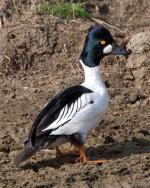
|
Common Goldeneye
|
Overview
Common Goldeneye: Medium diving duck, white-striped black upperparts, white underparts. Head is iridescent green-black with white circular patch between yellow eyes and dark gray bill. Wings are dark with large white patches conspicuous in flight. Legs and feet are yellow. Swift, direct flight. |
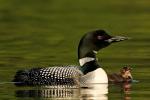
|
Common Loon
|
Overview
Common Loon: Large loon, white-spotted, black upperparts and white underparts. Head, neck are green-black with white-streaked neckbands. Bill is black and thick. Eyes are red-brown. Dives for small fish and crustaceans. Direct flight on strong deep wing beats, head, neck and feet extend beyond body. |
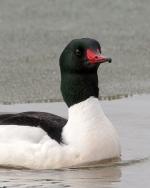
|
Common Merganser
|
Overview
Common Merganser: Large, sleek diving duck with black upperparts and white underparts. Head and upper neck are green-black with head crest usually not visible. Long, thin bill is bright red. Wings are black with extensive white patches. Feeds on fish, mollusks, crustaceans, insects and plants. |
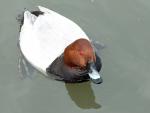
|
Common Pochard
|
Overview
Common Pochard: Medium-sized, colorful diving duck from Eurasia with a rich red-brown head, black breast and tail, and gray body. Dark bill has a pale gray saddle; eyes are red. Feeds on aquatic plants, dives often, sometimes dabbles. Swift direct flight on rapid wing beats. Flies in a V formation. |
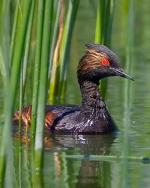
|
Eared Grebe
|
Overview
Eared Grebe: Small grebe with black upperparts, dark chestnut-brown flanks, white underparts. Head and neck are black, orange feathers on face. Eyes are red. Black legs and feet. Forages by diving and swimming underwater. Feeds on aquatic insects and crustaceans. Direct flight with rapid wing beats. |
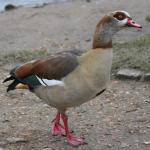
|
Egyptian Goose
|
The Egyptian Goose (Alopochen aegyptiacus) is a member of the duck, goose and swan family Anatidae. It is in the shelduck subfamily Tadorninae, and is the only extant member of the genus Alopochen. mtDNA cytochrome b sequence data suggest that the relationships of Alopochen to Tadorna need further investigation (Sraml et al. 1996).
Two or three species of Alopochen from the Madagascar region have become extinct in the last 1000 years or so: |
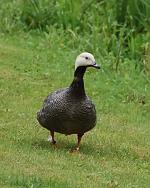
|
Emperor Goose
|
Overview
Emperor Goose: Small goose with slate-gray plumage subtly barred white and black. Head, hindneck are white while foreneck is dark. Short, pink bill. Tail is white with black undertail coverts. Legs are bright yellow-orange. Feeds on plants, crustaceans, mollusks. Direct flight with rapid wing beats. |
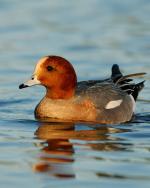
|
Eurasian Wigeon
|
Overview
Eurasian Wigeon: Large dabbling duck with gray back and finely speckled gray flanks. Head is dark rufous-brown with buff crown and forehead; breast, neck and upper back are pale rufous brown, belly is white. Wings have white shoulder patches and green specula visible in flight. Gray legs, feet. |
|
|